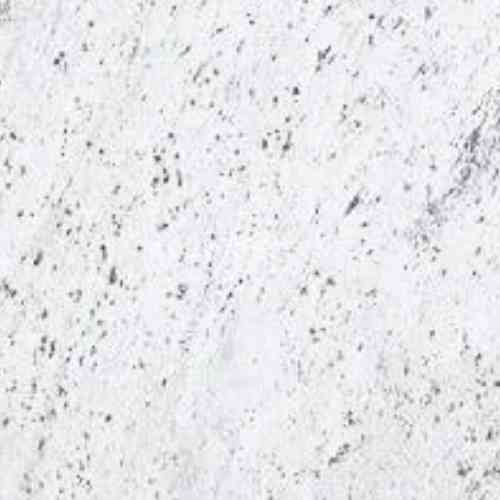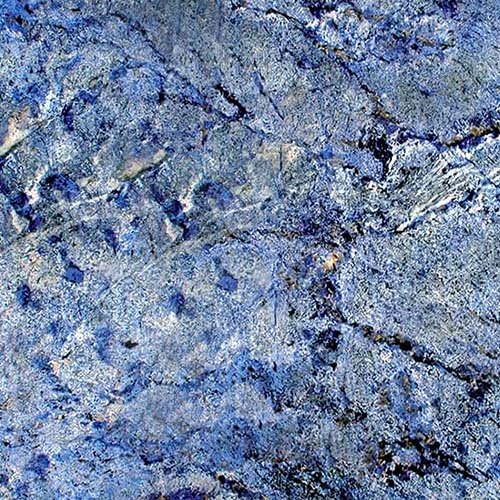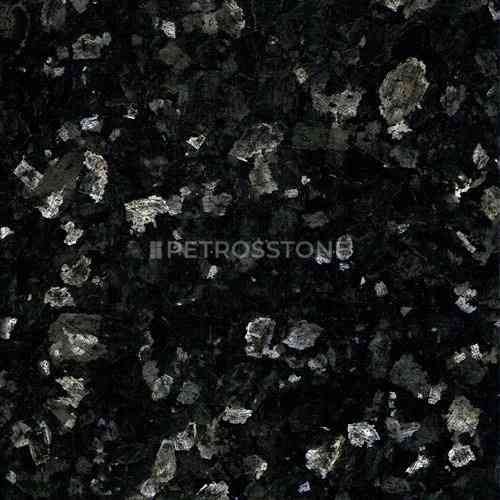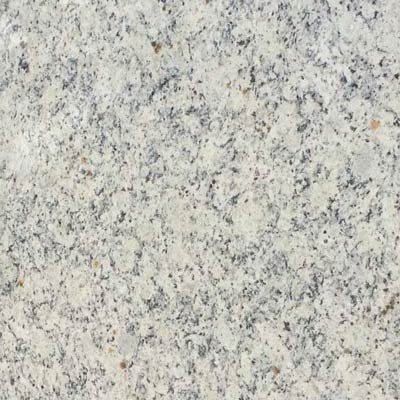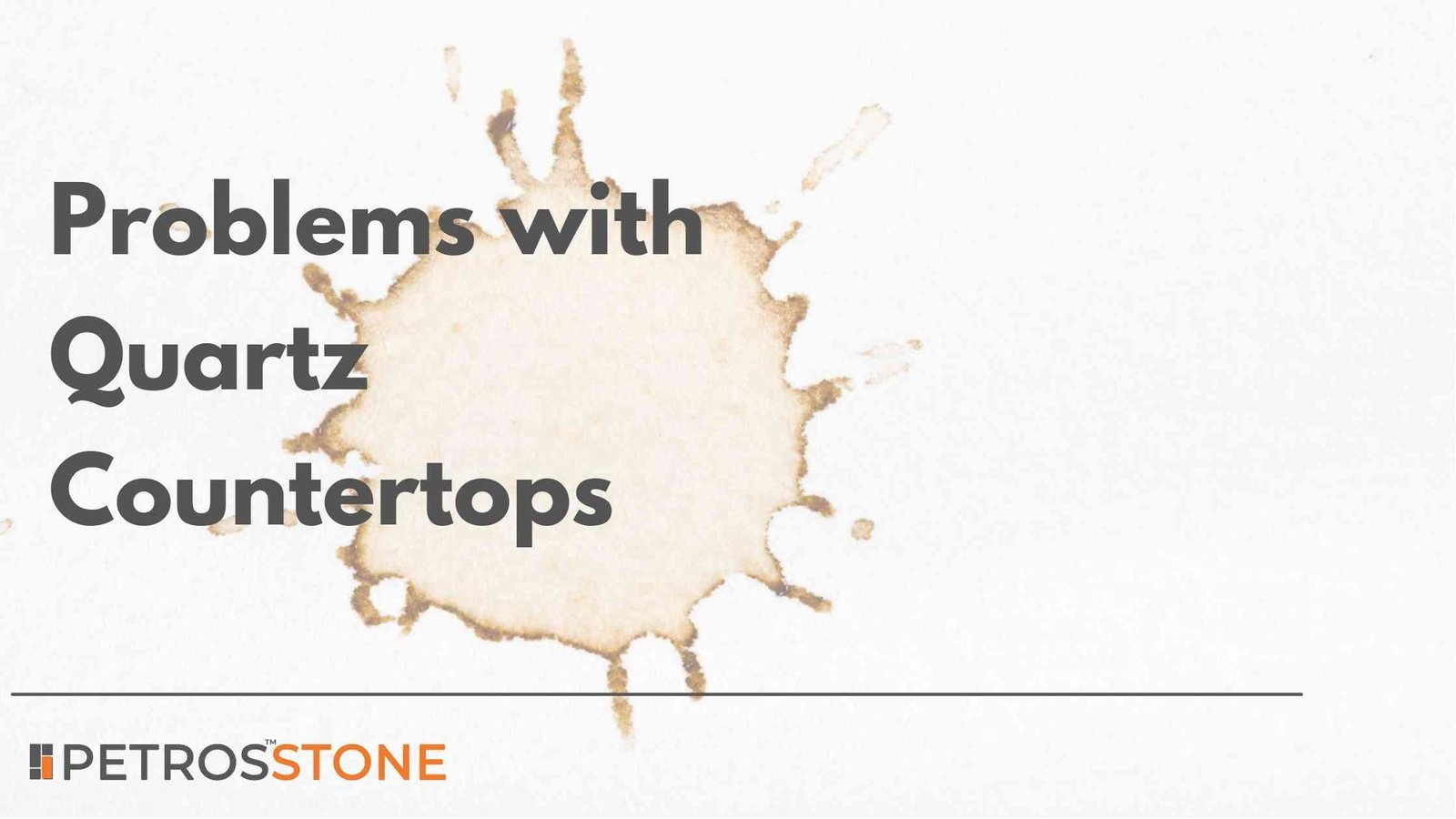
In this blog, we’ll uncover everything you need to know about quartz countertops, everyday problems that they come with, health risks, how to prevent these issues, and ethical alternatives. If you’re in the market for quartz countertops or just curious about what lies beneath the surface, this guide is for you.
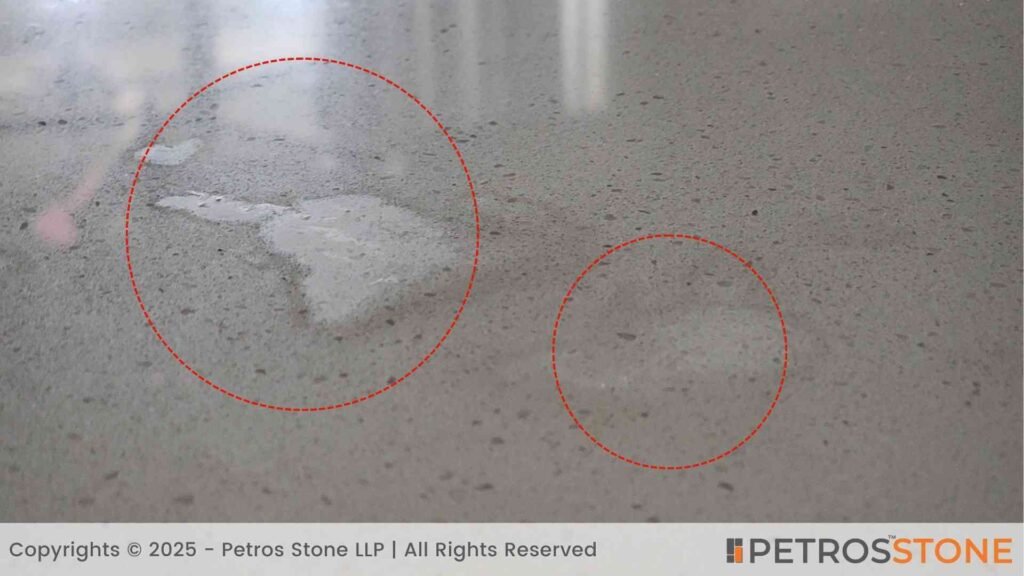
- So, Why Are Quartz Countertops So Popular?
- Key Advantages of Quartz Countertops
- Problems with Quartz Countertops
- 1. Does Quartz Stain?
- How to Prevent Quartz Staining
- 2. Does Quartz Crack?
- 3. Does Quartz Bend or Sag Over Time?
- 4. Does Quartz Discolor or Fade Over Time?
- 5. Does Quartz Chip Easily?
- 6. Does Quartz Release Harmful Chemicals?
- Health Concerns: Is Quartz Safe?
- What Companies Are Doing to Solve These Problems
- Finding Alternatives to Quartz Countertops
- Tips for Choosing the Right Countertop Material
- Final Thoughts: Is Quartz the Right Choice for You?
So, Why Are Quartz Countertops So Popular?
Quartz countertops are a popular choice for a reason, they are almost the perfect balance of beauty, function, and practicality. Like granite or marble, quartz is an engineered stone composed of crushed quartz (90-95%), resins, and pigments. And this manufacturing gives it properties that homeowners and interior designers will appreciate.
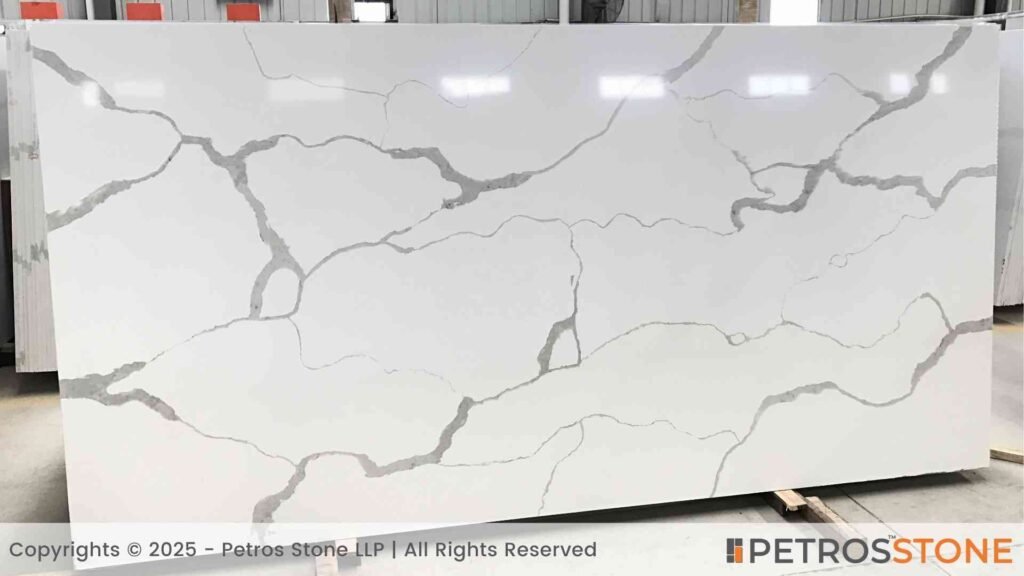

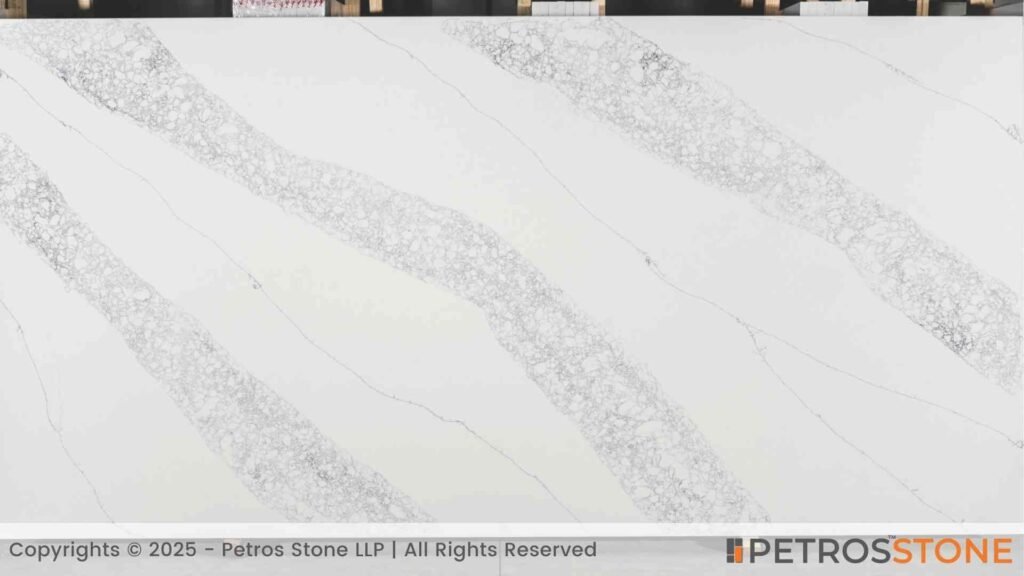
Key Advantages of Quartz Countertops
- Stain Resistance: The non-porous surface prevents liquids like wine, oil, or coffee from getting into the material. Quartz is more stain-resistant than natural stones like granite.
- Durability: Quartz resists scratches, chips, and cracks. This makes it ideal for high-traffic areas like kitchens.
- Low Maintenance: Quartz does not require sealing, polishing, or intensive upkeep like natural stones do.
- Design Variety: Quartz may mimic natural stones or be patterned with bold, modern designs. Almost any color or pattern is available, making it suitable for most interior styles.
But no material is perfect, and quartz is no exception. Find out what homeowners struggle with when choosing quartz countertops.
Problems with Quartz Countertops
1. Does Quartz Stain?
Quartz is marketed as stain-resistant but not stain-proof, a distinction many homeowners overlook. Though the nonporous surface repels most everyday spills, some substances penetrate the resin layer and turn the color pink.
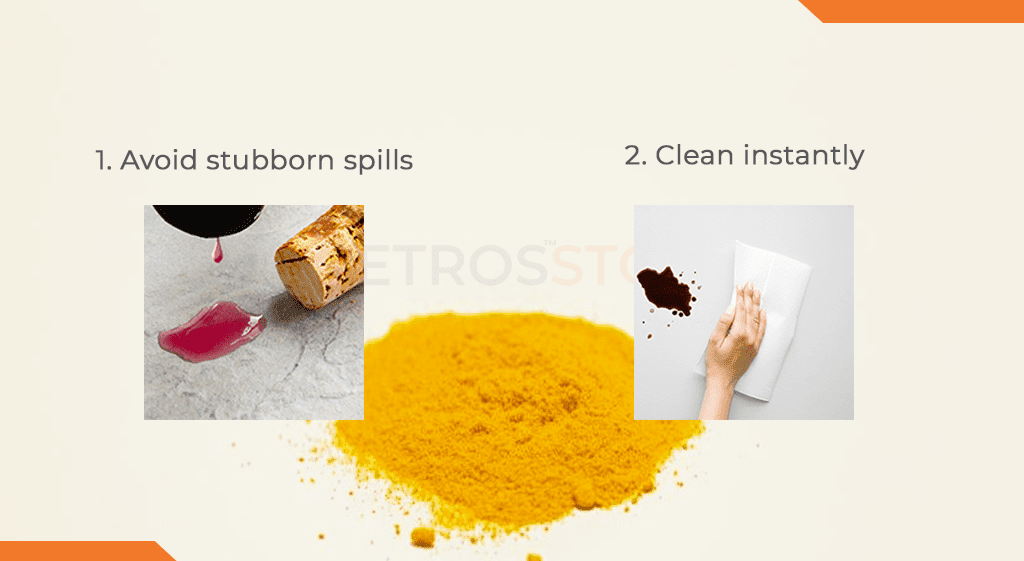
- Common culprits? Turmeric, red wine, coffee, tomato sauce, and some citrus cleaners.
- The resin that binds the crushed stone particles does not stain, unlike natural stone. Some resins resist staining better than others, but cheaper quartz is more easily stained.
- Even very long exposure to water, especially hard water, may produce dull patches over time.
A homeowner who cleans with bleach or harsh chemicals may find their white quartz countertop yellow or cloudy a sign that the resin is breaking down.
How to Prevent Quartz Staining
- Spills should be wiped up immediately with a soft cloth and pH-neutral soap.
- Use mild cleaning agents only – bleach, ammonia, or vinegar.
- Use cutting boards for work with dark foods such as turmeric or beet juice.
2. Does Quartz Crack?
Quartz is durable, but cracking can happen. Unlike natural stones like granite, quartz contains resins that expand and contract at extreme temperatures.
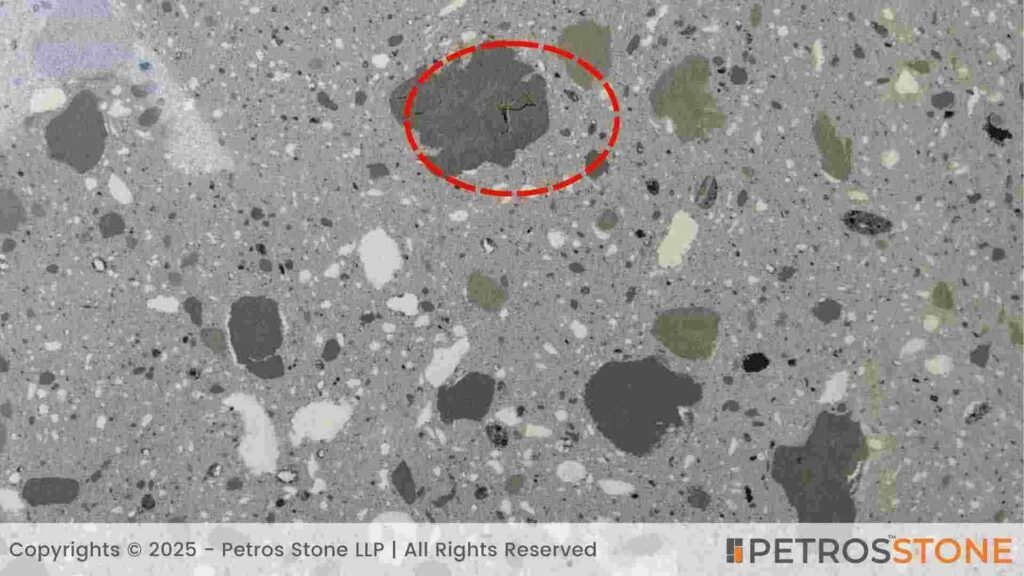
- The most common reason for cracks? Thermal shock. Placing a hot pan directly on a quartz surface can cause micro-cracks that worsen over time.
- Another reason? Improper installation. Not supporting the countertop evenly creates stress points that cause it to crack.
How to Prevent Cracks:
- For hot pans, use trivets or heat-resistant mats.
- Avoid standing or balancing on overhangs or edges.
- Ensure professional installation with proper bracing and support.
3. Does Quartz Bend or Sag Over Time?
Normal quartz will not bend or sag, but poor installation or inadequate support can cause problems, especially with large kitchen islands.

- If a quartz slab is installed over long spans without proper bracing, it can begin to sag over time.
- Excess weight from heavy cabinetry work and appliances on an unsupported section can speed up the bending process.
Suppose a homeowner installs a quartz island with a 12-inch overhang without additional support. A few years later, they see a little dip in the middle where people rest their elbows.
How to Prevent Sagging of Quartz Slabs?
- Long overhangs may need steel brackets or corbels reinforced.
- Ensure professional installation with proper structural support.
- Avoid placing extremely heavy appliances in unsupported areas.
4. Does Quartz Discolor or Fade Over Time?
Quartz is not UV resistant, so prolonged exposure to sunlight may fade, discolor or yellow, especially in lighter shades.

- Indoor risk: Direct sunlight in your kitchen can cause some quartz countertops to fade unevenly over time if they have large, south-facing windows.
- Outdoor risk: Homeowners mistakenly install quartz in outdoor kitchens only to discover that UV exposure changes the color within a few years.
How to Prevent Discoloration:
- Avoid installing quartz in areas that receive long, direct sunlight.
- Choose UV-resistant sealers or UV-resistant quartz brands.
- Outdoors, use another material if you use quartz – avoid areas in direct sunlight.
5. Does Quartz Chip Easily?
Quartz is high chip-resistant than some natural stones but not indestructible. These are especially prone to chips if something heavy falls on them, especially the edges and corners.
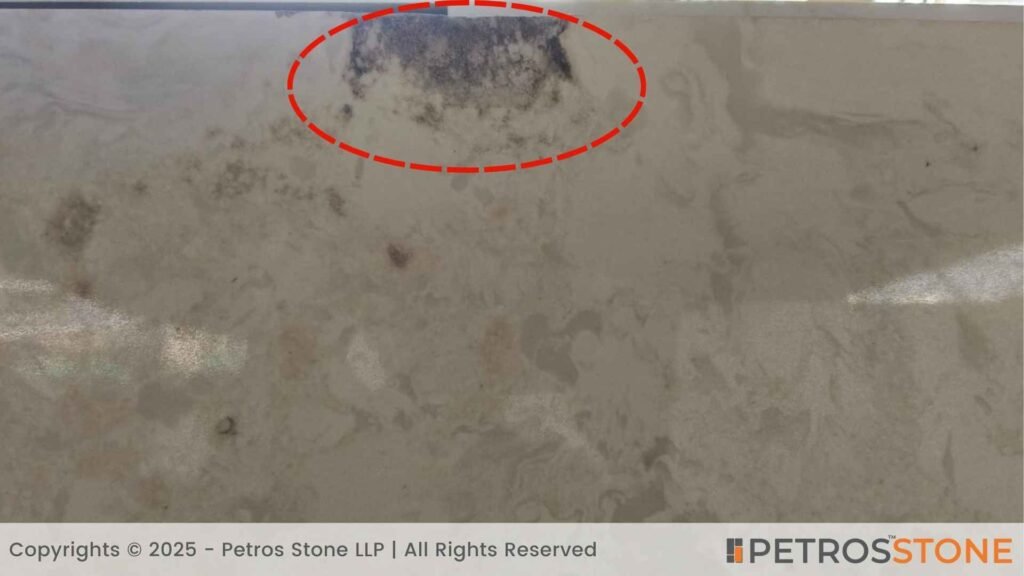
- A cast-iron skillet or heavy appliance may chip along the edges.
- Thin edges make Quartz countertops more likely to be damaged.
You can drop a heavy glass jar on their quartz island and it will chip.
How to Prevent Chipping of Quartz Countertops
- Pick rounded edges over sharp 90-degree corners.
- Be careful with heavy cookware near the edges.
- If a chip does occur, use a quartz repair kit or call a professional.
6. Does Quartz Release Harmful Chemicals?
Some homeowners don’t realize that quartz countertops contain resins and polymers that release volatile organic compounds (VOCs) over time.
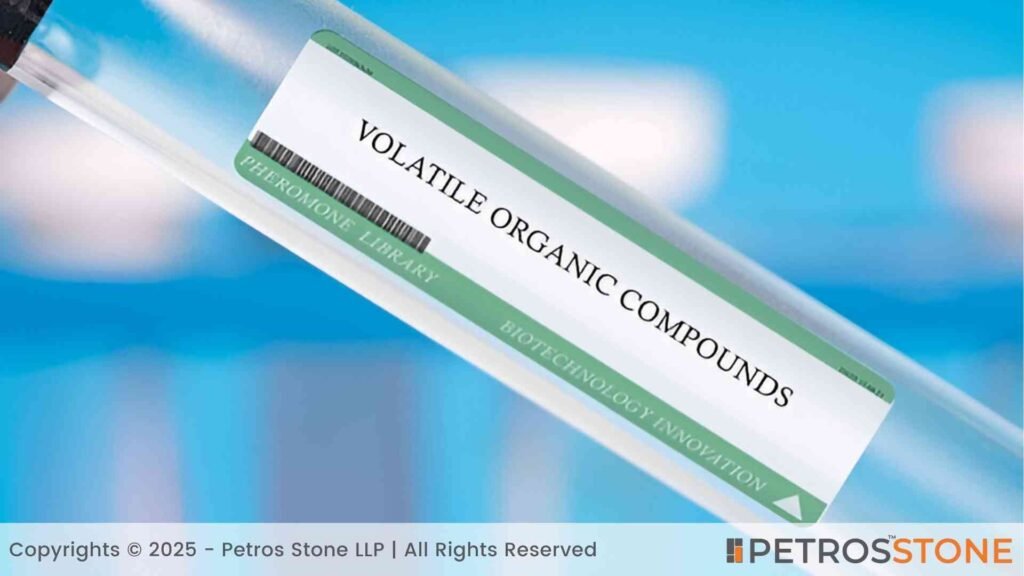
- Are all quartz slabs created equal? No. Expensive quartz products contain fewer VOCs for good indoor air quality, especially in poorly ventilated kitchens.
- The good news? Well-known quartz brands use low-VOC resins that comply with health and safety standards.
How to Minimize VOC Exposure:
- Buy quartz countertops from reputable brands that use low-VOC resins
- Buy quartz with the absence of a VOC Certificate or NSF certificate.
- Ventilate your kitchen and bathroom properly.
- For those sensitive to chemicals, try natural stone alternatives like granite or soapstone.
Health Concerns: Is Quartz Safe?
The quartz countertops are generally safe for homeowners. But their production creates serious health risks for workers in the industry.
1. Silicosis in Workers
The manufacturing of quartz involves cutting and grinding quartz crystals, which produce silica dust. Prolonged exposure to this dust can lead to silicosis, a potentially fatal lung disease. While this is a risk mainly for factory workers, it has sparked ethical concerns about the production process.
2. Indoor Air Quality
As mentioned earlier, quartz countertops can produce VOCs, although high-quality quartz products eliminate this risk, but homeowners with chemical sensitivities should be cautious.
What Companies Are Doing to Solve These Problems
The quartz industry doesn’t turn blind to these issues. Leading manufacturers offer practical and ethical solutions.
- Brands like Petros® Stone are making low-VOC, recycled quartz countertops.
- Others are using silica-free quartz alternatives to shield workers from silicosis hazards.
- Enhanced heat resistance and improved edge reinforcement for modern quartz slabs reduce chipping.
Finding Alternatives to Quartz Countertops
Quartz is popular, but not the only option. Whether it’s the right material for your home depends on other options – each with its own aesthetic, durability, and maintenance requirements. So whether your preference is sustainability, affordability, or timeless elegance, there is a countertop material for you. You have options like.
1. Granite
Granite has long been a kitchen staple. It is a tough natural stone that does not take heat and has a unique beauty from slab to slab. Natural veining and speckles in granite give it that organic look that many homeowners love.
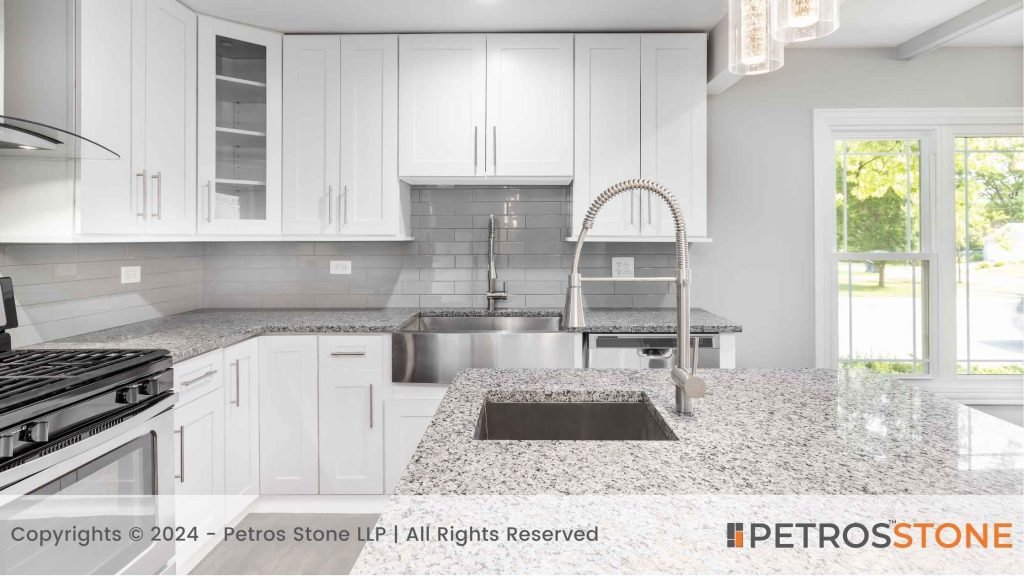
Pros
- Naturally heat-resistant: Put hot pans directly on top without breaking them.
- Extremely tough, ideal for high-traffic kitchens.
- Patterns vary: no two slabs are the same.
Cons
- Needs sealing at least once a year to prevent stains.
- High-quality slabs are expensive.
- Exposure to excessive force will crack the material.
Who it’s For: People who appreciate the beauty of stone and are willing to do some upkeep.
2. Marble
Marble is often associated with elegance and high-end kitchens. It exudes luxury with its smooth, cool surface and intricate veining. However, it’s not the most practical option for busy kitchens due to its delicate nature.
It is associated with elegance and expensive kitchens. It is smooth, cool and has fine veining. But it isn’t the best option for busy kitchens as it is very delicate.
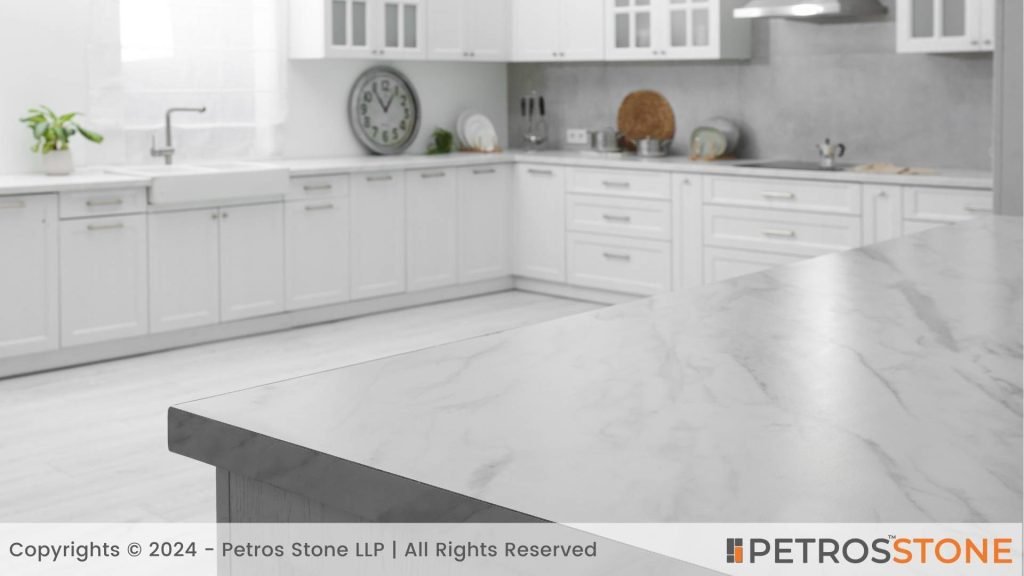
Pros
- Stunning aesthetic material for your kitchen or bathroom.
- Naturally cool, good for baking or rolling dough.
- A classic appeal that never goes out of style.
Cons
- Very porous – stains from acidic foods like lemon juice and wine.
- Soft and scratch-prone, requiring extra care.
- Expensive compared to other materials.
Best For: Those who love a luxurious, high-end look and are willing to take extra precautions to maintain it.
3. Soapstone
Soapstone is less-known but more durable than quartz. It is a non-porous natural stone that develops a patina over time. Like granite and marble, soapstone does not need sealing.
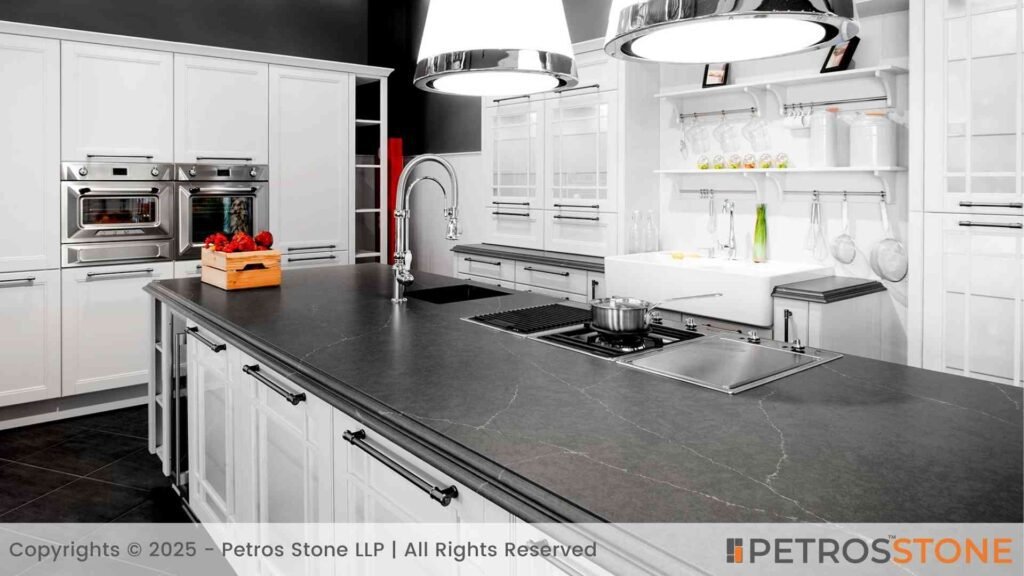
Pros
- Totally porous – resistant to stains and bacteria.
- Heat-resistant – you can set hot pots and pans on it safely. – you can set hot pots and pans on it safely.
- Old-fashioned appeal – darkens with age in your kitchen.
Cons
- It is softer than granite and susceptible to scratches.
- Limited color palette – mostly gray, black, or green.
- Can acquire a pronounced patina – not for everyone.
Who it’s For: Best for eco-conscious homeowners looking for an artistic statement piece for the kitchen.
4. Recycled Glass
If sustainability is top of your list, recycled glass countertops are a green alternative to quartz. These countertops contain crushed glass in resin or cement.
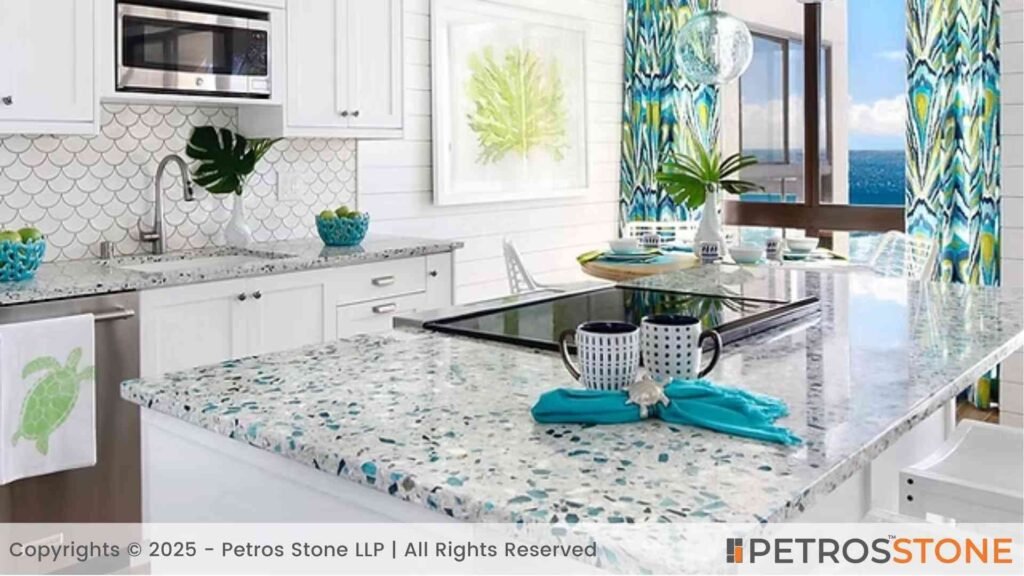
Pros
- Recycled materials are used.
- This non-porous surface is stain resistant.
- Unique, colorful designs for modern and contemporary kitchens.
Cons
- Not quite as tough as quartz – easily chipped or cracked.
- It is costly if you choose custom designs.
- The surface may be uneven depending on the manufacturing process.
Who it’s For: Best for eco-conscious homeowners looking for an artistic statement piece for the kitchen.
5. Butcher Block
Butcher block is a good alternative for a warm, charming countertop in your kitchen. Heaps of wood give it a warm, homey feel when paired with sleek modern appliances.
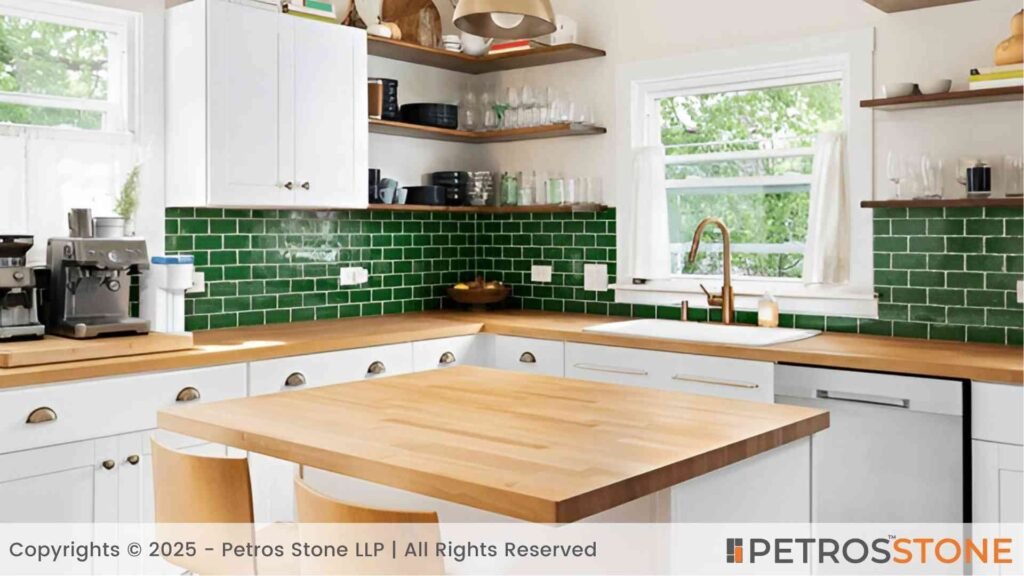
Pros
- A great cutting board for food prep.
- Can be refinished if it is scratched or stained.
- Add character and warmth to any space.
Cons
- Requires frequent oiling to prevent drying and cracking.
- Non-heat-resistant pots can withstand high temperatures without burning the surface.
- Can become bacterial if not properly maintained.
Who it’s For: Anyone with a warm, inviting kitchen who is willing to put in regular upkeep.
6. Porcelain
Ceramic Porcelain countertops are a more modern and functional alternative to quartz. The exterior is a very dense ceramic material that resists heat, scratches, and staining.

Pros:
- Super scratch resistant – good for heavy duty kitchens.
- Extreme temperature resistance: Can handle high heat!
- Non-porous, meaning it won’t absorb stains or bacteria.
Cons:
- There is limited design variety, but new printing technologies are opening up new possibilities.
- It can be brittle – edges may chip.
- Harder material leads to higher installation costs.
Who it’s For: Ideal for households that need a very low-maintenance, durable countertop that can withstand heavy use.
Tips for Choosing the Right Countertop Material
Choose a countertop material based on these factors:
- Functionality: Is this a countertop for a busy kitchen or a pretty bathroom vanity?
- Maintenance: How much upkeep are you willing to handle?
- Aesthetics: Does the material fit your design preferences?
- Budget: Keep in mind the cost of materials and installation.
- Environmental impact: Choose eco-friendly options.
Final Thoughts: Is Quartz the Right Choice for You?
Quartz countertops offer an appealing combination of style, durability, and low maintenance, but they’re not without their challenges. From staining and cracking to ethical concerns about production, it’s crucial to weigh the pros and cons before making a decision.
If you’re set on quartz, prioritize high-quality brands that address these issues through warranties.
Upgrade your space with premium, durable, and stylish quartz countertops from . Contact us today for expert guidance!
Quartz countertops combine style with durability and are low maintenance, but they come with their challenges too. There are pros and cons to buying a rug, from staining and cracking to ethical questions about production. For quartz, choose brands that solve these problems with innovative solutions.
Alternatives include granite, marble, and other materials. Get stylish quartz countertops from Petros® Stone.
Feel free to get in touch for a free consultation, quote, and get a detailed understanding from our experts here at Petros®. Visit https://petrosstone.com/ or call +91-8446360361 and WhatsApp

Hi, I’m Dhananjay,
With a background in architecture and years of industry experience, I share insights on materials that shape great design. At Petros® Stone, I craft content that highlights the beauty and utility of natural stone, helping architects, builders, and homeowners make informed choices while strengthening the brand’s voice and online presence.
Brown Granite
White Galaxy Granite
Blue Bahia Granite
Silver Cloud Granite
Black Pearl Granite
Dallas White Granite


